- Home
- T. Kingfisher
Clockwork Boys: Book One of the Clocktaur War
Clockwork Boys: Book One of the Clocktaur War Read online
Clockwork Boys
Book One of the Clocktaur War
T. Kingfisher
This is a work of fiction. Any resemblance to persons, places, plants, poets, events, or actual historical personages, living, dead, or trapped in a hellish afterlife is purely coincidental.
* * *
Copyright 2017 Ursula Vernon
* * *
All Rights Reserved
* * *
Published in the United States by Red Wombat Tea Company
Artwork by Ursula Vernon
Praise for T. Kingfisher
“…a book of re-told fairy tales, all in the quirky, matter-of-fact-in-the-face-of-total-nonsense style that I’ve always loved. They’re often dark, sometimes sad, but always endearing, even when they’re disturbing.”
—Pixelatedgeek.com
“…[A] knack for creating colorful, instantly memorable characters, and inhuman creatures capable of inspiring awe and wonder.”
—NPR Books
Weasel Invicti!
Contents
Chapter 1
Chapter 2
Chapter 3
Chapter 4
Chapter 5
Chapter 6
Chapter 7
Chapter 8
Chapter 9
Chapter 10
Chapter 11
Chapter 12
Chapter 13
Chapter 14
Chapter 15
Chapter 16
Chapter 17
Coming Soon
Acknowledgments
Also by T. Kingfisher
Chapter One
There are a number of smells one expects to encounter in a dungeon. Fresh rosemary generally isn’t one of them.
Slate grimaced and blotted her nose on her sleeve. It wasn’t that the herbal scent wasn’t a vast improvement—the ancient stone keep had been meant to hold prisoners in, not let odors out. The entire lower level stank of centuries of unwashed bodies, tallow candles, and despair.
The problem was that there was no earthly reason for the rosemary to be there. She knew already that there were no guards with a fondness for scented aftershaves, no potted herbs on the warder’s desk, and if she asked anyone else, they’d stare at her like she was crazy. The rosemary was all in her head.
Slate sighed.
It happened occasionally. Sometimes it meant “danger!” and sometimes it meant “here, look more closely, this is important!” As near as she could tell, the scent of rosemary flooded her nostrils when it was very important that she pay attention to…something.
Her grandmother had been a minor wonderworker. Slate figured the rosemary warning was probably inherited, and that she’d gotten the short end of the family stick.
Still, of all the magical odors one could be afflicted with, it could have been a lot worse. Goat. Skunk. Old cheese.
The rosemary hit her again, a direct blast, as if the crushed leaves were directly under her nostrils. Slate put a hand over her nose and wrinkled her eyes shut.
Fine, fine, you’ve got my attention…
“Sorry,” said the warder, “smells pretty rank down here. You get used to it. I hardly smell it myself.”
Slate nodded. It had been pretty thick before the rosemary choked her, although she’d smelled worse.
“Who’s left?” she asked, dropping her hand.
“Six in for assault, three murderers.”
“Lovely. All right, let’s see the ones up for assault.”
The warder opened a door and went inside. She heard shouting and muffled grumblings while he prodded the prisoners up to the bars. Slate tried to clear her head, got another whiff of rosemary, and pinched the bridge of her nose to steady herself.
Okay, okay, I know it’s important! I realize my life’s on the line here! Back off!
The phantom herb didn’t pay attention, but then, it never did. Slate turned in place, trying to get a better fix on it.
She was grateful that this sort of thing didn’t generally happen more than once or twice a year. It was always dreadfully annoying when it did, as if she were some kind of botanical bloodhound, following a scent that wasn’t really there.
It was hard to get a fix on any particular direction without wandering around with her nose in the air. She’d learned not to do that. People tended to look at you funny.
She sighed again. Maybe she’d be lucky, and it’d be one of the murderers. Then she could take him and get out of here, without any complications.
Beyond the current complications, which are already complicated enough, thank you.
“They’re ready, ma’am,” said the warder, leaning past the heavy wooden door.
Slate stepped over the threshold and into the hallway leading past the cells. Someone put his hands through the bars, then jerked them back when the warder made a move in his direction. Another prisoner laughed at him.
The men behind the bars were a sorry lot. The prison was progressive as such things went—they changed the straw regularly and gave everyone meals and fresh water—but there wasn’t much anyone could do about the lice or the smell or the despair.
Slate swept her eyes over the half-dozen men, frowning.
None of them were anything she’d want to take back to her partner. Most of them had the dull, sullen look of men who had fallen into violence for lack of any other option.
There was one near the end who had shoulders like an ox. He didn’t look very bright, but maybe he’d be good at hitting things.
At this point, that may be the best you can hope for. Who knew prison scum were so…unpromising?
The smart ones had talked or bought their way out, the truly dangerous ones had been hanged already—what was left were the dregs. She couldn’t see trusting any of these men, even on a suicide mission.
And none of them smelled of rosemary.
Women were rare enough down here that some of the prisoners watched her avidly, crowding against the bars, even as nondescript a little thing as she was. She tried hard to be nondescript; it was one of her great assets. Short, drab, brown hair, brown skin, eyes of no particular color set in a face of no particular beauty—these were tools as useful in their way as grappling hooks and forger’s pens.
Still, even a nondescript woman was more than they usually saw in the dungeons. There were one or two catcalls and much grabbing of crotches, but no scent of rosemary.
The warder made as if to stop the men’s behavior, but something—probably Slate’s total indifference—dissuaded him. “Ma’am?”
“No,” she said. “None of these will do, I don’t think.” She sighed, glanced over the big one—I suppose if there’s no one else, he’ll have to do—then grimaced again. “I suppose we’d better look at the murderers, god help us all.”
“Are you sure? One of ’em’s in for arson too, and he’s a bad one.”
She touched the courier pouch slung at her waist, with its papers. “I’m given my pick of the prisons, by the Dowager’s orders.”
And it’s only by her grace—and this mad notion of hers—that I’m not in a cell myself. I don’t think you know that. I don’t think you need to know that.
“I know, but…”
The warder, Slate suspected, was a decent man, and would obey orders without question, but his sensibilities were deeply offended by the notion of a woman coming in and possibly releasing a murderer. Slate wasn’t exactly keen on the idea herself. She didn’t mind traveling with murderers—she’d slit a throat or two in her time, and Brenner’s entire career was founded on other people’s corpses—but arsonists were something else again, and did not make for comfortable trave
ling companions.
Then again, the gods knew, she and Brenner couldn’t undertake this mad venture entirely on their own.
She patted the warder absently on the shoulder. “I don’t much like it either, but orders are orders. Let’s see them.”
The warder sighed and went to go roust the murderers.
It wasn’t impossible that there was something in the keep itself that was setting off Slate’s rosemary sense. People said that the Dowager’s keep was built on the ruins of an older building. People said that there were rooms no one had opened in a thousand years, filled with old wonders from civilizations dead and gone.
People said a lot of stupid things.
Slate had, in her line of work, fenced several objects supposedly from that distant past. At least two had been fakes, but an artificer she trusted had sworn that one was real. None of them had smelled of rosemary and none of them had done anything particularly magical. She’d forged the certificates of authenticity and sent it on its way and that was that.
The warder opened the door and beckoned her down to the line of murderers.
Perhaps fortunately, none of them smelt of rosemary either. Two were vague, silent creatures, and the third was a ratty young man whose eyes moved over her body like insect feet. She met his gaze and he looked away immediately, then back at her, then at the warder. No question which one was in here for starting lethal fires.
Definitely not. This one was a mad dog—he wouldn’t fear her, and fear of Brenner’s knives wouldn’t hold him for long. They’d have to kill him within hours, and what good would that do anybody?
I don’t mind if he kills me, but I’d as soon skip the preliminaries...
“No.” Slate left the cell block and went back out into the main room. The rosemary had to be coming from somewhere. One of the wardens? God, how will I explain that?
The rosemary flooded her nostrils again.
Slate glanced at the door. The warder was still inside, settling the prisoners, and couldn’t see her doing anything…odd.
She closed her eyes, tilted her head back, and sniffed.
By turning her head and taking several blind steps, she got a brief sense of direction from the smell. Assuming she wasn’t deluding herself, it seemed stronger from one side of the room. She navigated that way with eyes closed, took a step, then another—definitely getting stronger—took a third step and banged her thigh on the warden’s corner desk.
“Bugger!” She glanced around, rubbing her leg, didn’t see the warden, and went back to sniffing. Ah—almost—no—there!
“Ma’am?” said the warden, behind her.
The elusive rosemary fled. Slate opened her eyes, and found her nose inches from another door.
“Who’s behind here?”
“Oh,” said the warden. “Oh—ma’am, you don’t want that one. He’s bad. I mean, they’re all bad, but he’s—you really don’t want that one.”
“Unfortunately, I think I might,” she said with a sigh. “Open the door, please.”
The warder gave her a long look, but the Dowager’s orders were stronger than his sense of propriety. He fumbled a key out of his key ring and opened the door.
The walkway was shorter than the one through the murderer’s row, the cells smaller. All of them were empty. Slate stepped into the hall, feeling the flagstones cold and slippery underfoot.
She walked to the end, to the single occupied cell, and turned to look at the prisoner.
Rosemary hit her so strongly that she nearly choked. Slate had to throw her sleeve across her suddenly dripping nose. If it had smelled like crushed leaves before, now it was as if someone had poured purest rosemary oil directly into her nasal passages.
She choked on a sneeze. Bad things happened in the back of her throat.
Fine. Fine. I get it.
It was a very small cell with no windows.
The prisoner was a tall, dark-haired man with a shaggy growth of beard. His age was indeterminate, but she wouldn’t put him over forty, probably less. The beard didn’t help, and he was far back in the shadows.
He was sitting with his back against the wall, watching her with unreadable eyes.
Slate tried to say, “Excuse me,” snuffled, and sneezed twice.
An eyebrow went up, but he didn’t say anything.
I suppose “Bless you,” is a little much to ask under the circumstances.
“Are you—damn—urrrggghhkk—” Her tongue pressed itself to the roof of her mouth as rosemary stormed the castle of her sinuses. There were no survivors.
She sneezed until she could sneeze no more. Her eyelids ached. She put her hands over her face.
“I’d offer you a handkerchief, but I’m fresh out,” the prisoner said. He had a dry, abrasive voice. “I’m sorry if the smell offends you.”
“It’s not—” she waved a hand, still scrubbing at her traitorous nose and watering eyes. “It’s—snorgggk—allergies. Sorry.”
The other eyebrow went up, whether at the allergies or the apology. Slate wondered if it mattered which one. He didn’t say anything.
She got herself under control, sniffled a few times, and put one hand on the bars. “What are you in for?”
The prisoner looked away contemptuously.
“He killed eight nuns and two guards,” said the warden behind her. She could hear the glower without turning around.
“In fairness,” said the prisoner, holding up a finger, “it was three nuns and five novices. And I was possessed at the time.”
“Possessed?” she repeated, barely registering the word. He looked intelligent enough, at least compared to the alternatives, and the odds of their success hinging on his ability to, say, do long division in his head seemed unlikely. I’ve got that bit covered anyway. There was muscle enough on his frame for her purposes, but there was a slight hunch to his shoulders that worried her.
She moved suddenly, experimentally, and he flinched. Only a fraction, barely noticeable, but she’d been watching for it.
He’s not broken, but he’s got something. Shock, maybe. Definitely damaged goods. Could just be from being locked in here for a while, though. Hmm.
Still, I’m only asking him to die, not reintegrate with society, so maybe that won’t matter.
I suppose being possessed could be problematic.
Unless it helps.
The rosemary smacked her again. She turned away from the cell, groping for a handkerchief that, at this point, provided only emotional support.
“Snerrrghghk…”
“Generally, the gawkers actually know who they’re looking at,” the prisoner said. “If the temple is sending women to minister to me in my hour of need, they might consider screening them better.”
The warden grunted. Slate flapped a hand at the prisoner irritably, face buried in the damp handkerchief.
Eight nuns and novices and two guards. Would you do that if the bars weren’t there?
Oh, probably.
“Wait—” she said, as it finally dawned on her. Possibly the sneezing had knocked some stray memory loose. “Possessed? Eight nuns?” She turned to look at the warder, who nodded glumly. “Lord Caliban?”
It had been a nine-day wonder through the capitol—the madness of Lord Caliban, the Dreaming God’s knight-champion, paladin and demonslayer, who had been taken by a demon himself and run mad, killing half the priestesses in his god’s temple in one single bloody morning.
She stared at him.
He inclined his head. “Sir Caliban, actually. They stripped me of my title, although they were forced to leave me the knighthood. At your service, I’m sure.”
“I thought they’d hung you!”
This was perhaps not the most tactful thing that Slate had ever said. Judging by the angle of his eyebrows, it was not the most tactful thing he’d ever heard, either.
He rose to his feet. He moved well enough, for a tall man in a box barely six paces wide. He lacked Brenner’s dangerous grace, but knights were in a d
ifferent line of work than assassins, at least technically.
Same line of work, different approach, I suppose.
“Indeed,” said Sir Caliban. “It was judged that since I was possessed, I was not exactly responsible for my actions, and so I was given…mercy.” He sketched the lines of the small cell with one hand.
“Did they exorcise your demon?”
“The demon is dead.”
“But if you were possessed, why did they lock you up at all?”
He exhaled, a sound a little short of a sigh but rather longer than a snort. “Must I go into it?”
“Do you have anything else to do today?”
“Fair enough.” He gave her a small, mocking salute, perhaps in acknowledgement. “Well. Questions of guilt have always been difficult with demons. It was determined that a soul such as mine must have been guilty of…something…to allow the demon entrance. And so…” Again, that quick sketching gesture, marking the boundaries of a severely limited world.
“Were you guilty?”
His eyes glittered, but he didn’t say anything. Slate hadn’t really expected an answer.
She leaned against the bars, moving more slowly. The warder started to say something, and she waved him off.
Moving equally slowly, like a strange cat meeting another in an alley, Caliban approached the bars.
“You’re not from the temple. For a gawker, you’re singularly ill-informed. And you’re standing much too close to the bars for anyone with sense.”
If he expected her to recoil in horror, he was disappointed. He stopped a foot or two away. Slate was fairly sure that he could get an arm through the bars and around her throat if he chose, and equally sure that she could get out of the way if he tried, as long as the warden didn’t do anything stupid, like rush to her defense.

 Paladin's Strength
Paladin's Strength The Twisted Ones
The Twisted Ones The Hollow Places
The Hollow Places Paladin’s Hope: Book Three of the Saint of Steel
Paladin’s Hope: Book Three of the Saint of Steel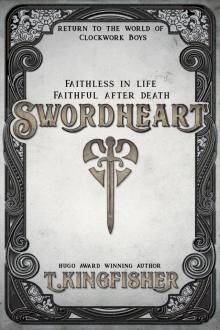 Swordheart
Swordheart Jackalope Wives And Other Stories
Jackalope Wives And Other Stories A Wizard's Guide to Defensive Baking
A Wizard's Guide to Defensive Baking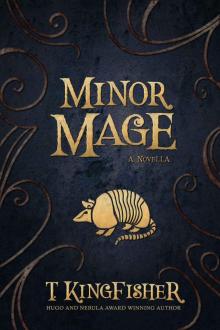 Minor Mage
Minor Mage The Halcyon Fairy Book
The Halcyon Fairy Book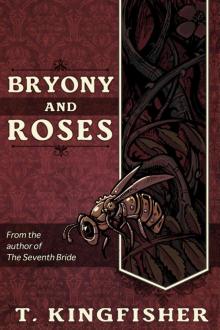 Bryony and Roses
Bryony and Roses The Wonder Engine_Book Two of the Clocktaur War
The Wonder Engine_Book Two of the Clocktaur War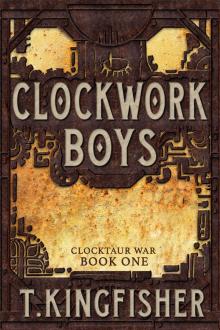 Clockwork Boys: Book One of the Clocktaur War
Clockwork Boys: Book One of the Clocktaur War The Raven and the Reindeer
The Raven and the Reindeer Summer in Orcus
Summer in Orcus The Wonder Engine
The Wonder Engine Seventh Bride
Seventh Bride Toad Words
Toad Words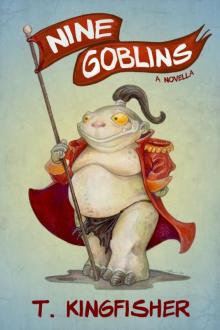 Nine Goblins
Nine Goblins